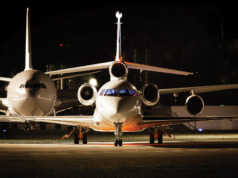
As an aircraft owner and/or operator, you often have options when selecting an FBO at your destination. Although fair and reasonable fuel prices and fees are key, loyalty to an FBO goes much deeper, and usually is based on three criteria:
Your Pilot’s First Impression
Although a modern and attractive facility is nice, upon arrival your pilot first will see and evaluate:
- Whether or not there is a line technician waiting on the FBO ramp when your aircraft arrives, and if he or she gives authoritative parking guidance.
- If the ground handling equipment (aircraft tugs, ground power units, de-icing trucks) looks cared for, stored, and organized.
- Whether the line service technician or customer service rep greets your aircraft with your service order (including fuel, catering, and any maintenance service requirements) in hand, which your pilot has sent ahead. The first words of greeting never should be: “How can I help you?” They already should know, unless yours is a last-minute, unscheduled stop.
Your Customer Experience
When visiting an FBO for the first time, you want to see physical proof that taking good care of you and your aircraft is its number one concern. Notice:
- Are you greeted warmly, and your baggage off-loaded quickly?
- Is your ground transportation ready and waiting when you arrive, with the interior cooled down or warmed up, as required by current weather conditions?
- Is the ramp and terminal area safe? Is appropriate security in place to insure that only your crew and authorized FBO personnel have access to your aircraft?
- Upon arrival, is the FBO also able to meet your crew’s interim requirements, such as a complimentary crew car and crew rest area in the terminal?
- Is the Executive Terminal clean and well-maintained?
- If you are meeting business associates or guests at the FBO, have they been properly greeted and kept informed of your expected arrival time?
- When you return to the FBO for departure:
- Is your ground transportation able to gain access to the ramp?
- Has your aircraft been properly serviced and positioned for
embarking in a timely manner? - Is your catering order ready and accurate?
A Safety-Minded Culture
You or your crew also will choose an FBO based on its safety culture. This means that the operation has set and adheres to industry safety standards, and operates in a culture that mitigates risk. Protecting you, your crew and passengers, and your aircraft – a significant and costly capital asset – should be paramount.
Many aircraft operators, especially those who fly internationally, adhere to the International Standard for Business Aircraft Operations (IS-BAO). They find that the process of adopting this standard, which includes incorporating a safety management system (SMS), changes the internal culture of a flight department to become more safety conscious (see “Are You ‘Safe’?” in this issue).
Your flight operation likely will have vetted the FBO’s safety commitment before your arrival, to determine whether it has adopted a program like Safety 1st, developed by the National Air Transportation Association. This program helps create a safety standard for line operations, provides consistent safety training throughout the enterprise, and enables the FBO to operate with a “safety first” mindset.
Those FBOs striving for the next level of safety will implement the International Standard for Business Aviation Handlers (IS-BAH), the equivalent to aircraft operators’ IS-BAO program. This new program incorporates a strong SMS component, which helps enhance an internal safety culture, and mitigates risk.
Being mindful of these factors can help you and your crew choose the best FBO for your needs, every stop, every time. BAA
John Enticknap and Ron Jackson are principals of Aviation Business Strategies Group, an aviation services consulting firm providing assistance in successful FBO Operations, Customer Service Training, and IS-BAH registration compliance and auditing.




